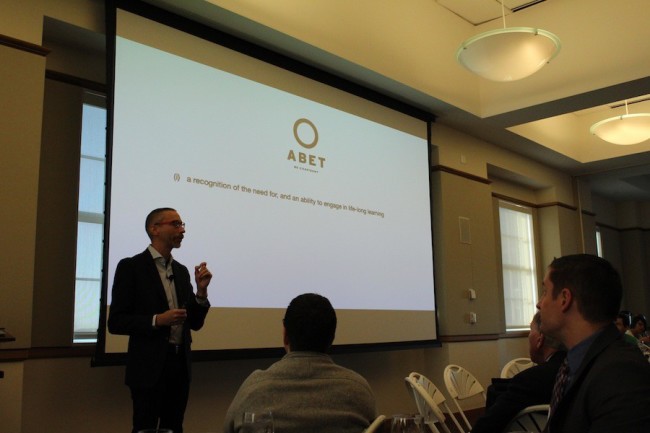Editor’s note, March 21, 3:30 p.m.: This story has been updated throughout.
Professors at the Lyle School of Engineering got schooled Wednesday morning on how to better motivate their students in the classroom. Faculty, alumni and students packed Caruth Hall’s Palmer Conference Center to hear Dr. Jonathan Stolk share his research on tailoring course content to students’ needs and emotions.
“We’re really trying to pull back the layers of this ‘motivation onion’ to get at some of the core issues of what is the psychology of students in the classroom,” Stolk said in an interview before his lecture on March 2.
Stolk was hired by Lyle last year to direct the school’s Caruth Institute for Engineering Education. Dr. Marc P. Christensen, the dean of the Lyle School of Engineering, believes Stolk’s presence on The Hilltop will help change the way professors interact with students for the better.
“We brought him here to be the tip of the spear on changing the way we’re looking at engineering education in particular,” Christensen said during the pre-lecture breakfast. “Being able to know what levers to pull to get students excited to learn things in the classroom is something we want to see integrated all across the Lyle School and all across campus.”
Stolk’s research is based on self-motivation theory, a theory that maps students’ motivational responses to various classroom dynamics. Some of these motivations include extrinsic drive, or studying based on rewards and punishments, and intrinsic drive, or studying out of enjoyment, passion and interest.
The theory suggests that different types of motivations stem from different classroom experiences. An unmotivated student may only participate in the class to avoid a bad grade while a motivated student may go out of their way to pursue the subject. Classroom motivation can be the difference between a student rehearsing knowledge or looking forward to learning.
The goal of Stolk’s research is to create better classroom environments and increased creativity, collaboration, self-directed learning, and critical thinking. Dr. Duncan MacFarlane, the associate dean for Engineering Entrepreneurship, believes that Stolk’s research not only has implications for Lyle students, but for global education in general.

“Jon’s research is paramount to that effort of improving productivity and the economic strength not only of the states, but of all the other countries around the world,” MacFarlane said before the lecture. “I do believe as we become more enlightened in engineering, tapping into the active energy of our students helps them learn.”
Christensen agrees with MacFarlane, adding that Stolk’s research is exactly what educators need to improve education in the U.S.
“You look at what’s happening in math and science education across the world, the United States is slipping,” Christensen said. “We’re 18th in one and 29th in the other compared to other countries around the world. This is critically important for the future.”
“One of the interesting things about the motivation theory is that it doesn’t restrict itself to a particular level or domain,” Stolk said. “K-12 is in dire need of redesign that is aimed at the person, a human centered design that triggers positive emotions and motivations instead of students being programmed to do what the teacher tells them to do.”
Lyle is gradually integrating Stolk into the classroom as he designs new plans for the Caruth Institute. Christensen is excited to see how Lyle students respond to Stolk’s teaching methods.








